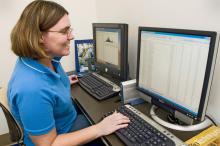Information Possibly Outdated
The information presented on this page was originally released on January 8, 2009. It may not be outdated, but please search our site for more current information. If you plan to quote or reference this information in a publication, please check with the Extension specialist or author before proceeding.
Aussie native feels at home with new life in Mississippi
By Patti Drapala
MSU Ag Communications
MISSISSIPPI STATE -- When Australia native Fiona McCarthy arrived three years ago to begin work at Mississippi State University as a biocuration specialist for the College of Veterinary Medicine, she felt an innate connection with home.
McCarthy grew up in Queensland, a state in Australia that is located in the northwest corner of the country close to the equator. The area is known for its hot climate, rural lifestyle and reverence for sports. Aussies refer to it as part of the Deep South.
“Queensland has many similarities with Mississippi,” she said. “If you're from Queensland, you are thought of by Australians as being ‘from the country,' and the same may hold true for Mississippians who go to other parts of the United States.”
McCarthy and her four brothers were children of parents who owned a cattle and sheep ranch near Hughenden, a small town about 890 miles northwest of Queensland's capital city of Brisbane. Those agricultural roots set her on a career path that eventually brought her to CVM as an assistant research professor in the Department of Basic Sciences.
As a young child, McCarthy entertained thoughts of becoming a teacher or nurse, but a background in agriculture and an affinity for science pulled her in another direction. She earned bachelor's and master's degrees from the University of Queensland in Brisbane.
While in school, she worked on agricultural research projects for the Molecular Animal Genetics Centre at the Commonwealth Scientific and Industrial Research Organization, which is Australia's government-agency equivalent to the U. S. Department of Agriculture. While working on her doctorate, McCarthy collaborated on research conducted by the university's Institute for Molecular Biosciences and the Queensland Agriculture Biotechnology Centre.
In 2003, McCarthy was faced with a decision to go abroad for post-doctoral study, which is a common goal for many Australians seeking to advance in a chosen scientific field.
“Australians view the choice to work overseas as positive and necessary because that opportunity hopefully will set up future collaborations between Australia and other countries that help solve common problems,” she said.
McCarthy applied for research positions at the University of Iowa and at MSU. The one at MSU offered an opportunity to engage in biocuration, an emerging and developing field of science.
Biocuration is a process in which a practitioner works with biological information generated by other researchers to organize, represent, and make the data accessible to humans and computers. Scientists who study genetic sequencing of DNA in living organisms generate a tremendous amount of data, but such information requires a contextual framework to mean something.
“To understand the situation that researchers face, picture yourself with a long shopping list and being presented with thousands of pieces of merchandise,” she said. “How do you begin to find what you want, and then how do you make sense of what you find?”
As part of her job responsibilities, McCarthy often collaborates with CVM genomics professors Mark Lawrence, who is mapping the DNA of bacteria that may cause bovine respiratory disease in cattle, and Shane Burgess, who works on mapping the DNA of chickens to understand how pathogens cause disease in poultry.
“Dr. McCarthy has had an enormous impact on our ability to do competitive research in genomic biology,” Burgess said. “Not only is she an expert molecular virologist, but she also is an internationally respected bioinformaticist, which is a unique combination that few scientists in the world have.”
Lawrence said McCarthy's expertise has contributed to the credibility of the College of Veterinary Medicine in submitting successful grant proposals for genomics research.
“Dr. McCarthy's work in developing and releasing annotation tools has been invaluable for analysis of our gene and protein expression experiments,” he said. “We are fortunate to have a biocuration scientist of her caliber.”
McCarthy's primary work area is a small room with laptop computers and three graduate assistants sifting through biological databases and professional research papers. If she has to travel, she can take her laptop laboratory with her.
When she has free time, McCarthy said she enjoys being a surrogate pet owner for vacationing friends. Even more satisfying for her is finding a good game of cricket, a sport in Australia that creates the same obsessive following as football does in Mississippi.
“I was so happy to discover that MSU has a cricket team,” she said. “I figured if the university had a cricket team, then life here wouldn't be all that bad.”



